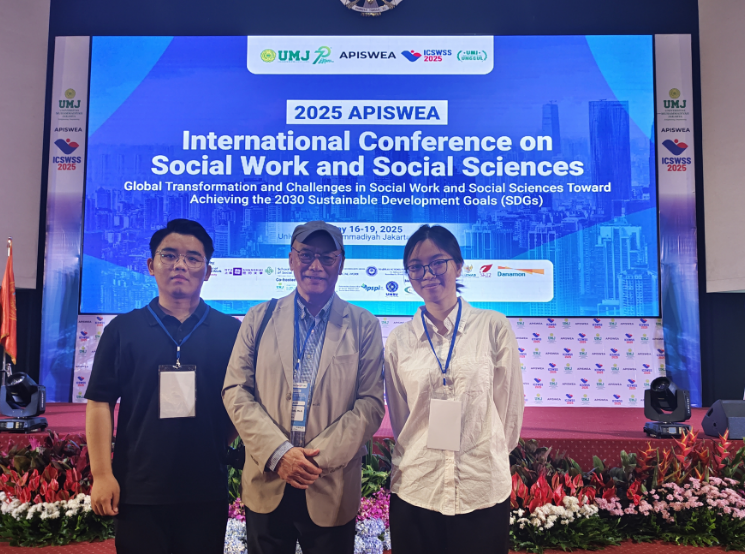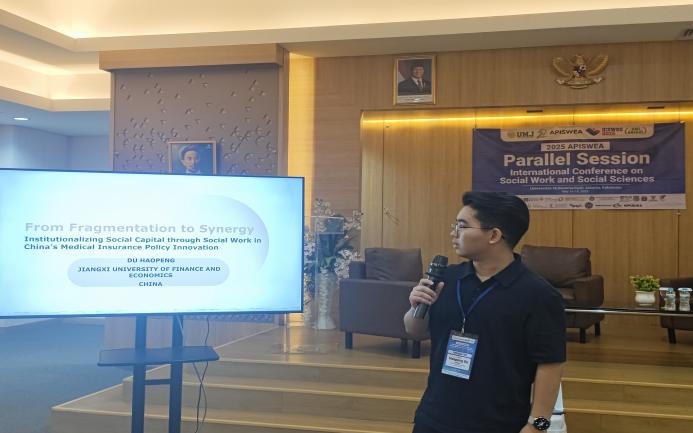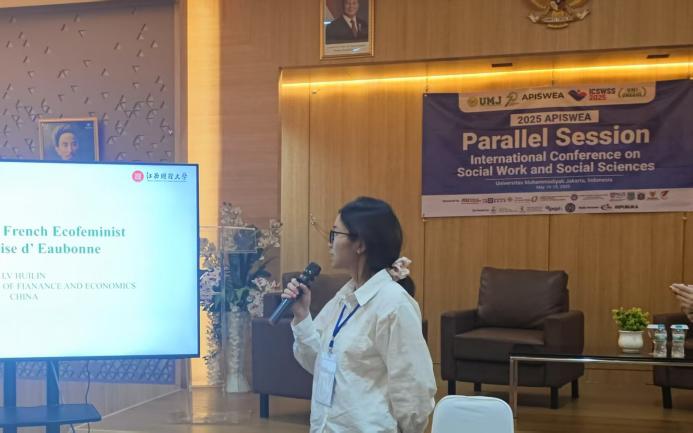From May 17th to 19th, 2025, the International Annual Conference of the Asia-Pacific Association of Social Work Educators (APISWEA) was held in Jakarta, Indonesia. Jointly organized by Muhammadiyah University Jakarta (UMJ), APISWEA, and the Informasi Pekerja Sosial Profesional Indonesia (IPSPI), the conference attracted scholars, experts, and social work practitioners from countries including the United States, China, South Korea, and Bangladesh. Graduate students Du Haopeng and Lyu Huilin from the School of Society and Humanities presented their research papers at the conference, which were guided by Professor Yin Zhonghai, Director of the Green Development and Chinese Path to Modernization Research Center.

Figure 1: Students Du Haopeng and Lyu Huilin with Professor Peter Szto
The conference was inaugurated at Muhammadiyah University Jakarta on the morning of the 17th. Dr. Halaevalu F. Vakalahi, President of the U.S. Council on Social Work Education (CSWE), delivered the opening remarks. This was followed by addresses from the Rector of Muhammadiyah University Jakarta, representatives of APISWEA and APKPSI, and a Commissioner from the Ministry of Social Affairs of the Republic of Indonesia. Speakers emphasized deepening cooperation in key areas such as community development and empowerment of vulnerable groups through establishing regular regional dialogue mechanisms. They underscored the critical importance of cross-border academic collaboration in building a more inclusive Asia-Pacific social service system and reconstructing the global knowledge paradigm for social work.
Subsequently, discussions centered on the theme Social Work Transformation and Challenges in Achieving the 2030 Sustainable Development Goals (SDGs). Professor Xu Qingwen from New York University’s SiLyuer School of Social Work discussed global social work education and practice, highlighting the necessity of strengthening internationalization and diversity within the field and cultivating professionals with global responsibility and cross-cultural communication skills. Professor Peter Szto from the University of Nebraska explored the integration of photography and mental health social work, expanding social work methodologies. Professor Violet Horvath, Director of the Pacific Disability Center at the University of Hawai’i, raised the critical issue of Invisible Disabilities within society, exposing the challenges in the social support systems for disabled populations across the Asia-Pacific region. Professor Isbandi Rukminto Adi from the University of Indonesia elaborated on the synergistic mechanisms between social welfare theory and national strategy.
During the presentation sessions, Du Haopeng presented his paper titled From Fragmentation to Collaboration: Institutionalizing Social Capital through Social Work to Drive Innovation in China’s Healthcare Policy. He identified three major developmental bottlenecks in the current healthcare system: the dominant fiscal transfer payment model weakening local policy adaptability, the absence of a preventive healthcare system exacerbating the intergenerational transmission of health poverty, and rigid eligibility criteria creating governance tensions with traditional community trust networks. He argued these structural flaws lead to medical resource misallocation, disorderly chronic disease management, and the hollowing out of informal security systems. Lyu Huilin focused on the eco-feminist thought of French scholar Françoise d’Eaubonne, summarizing her contributions to eco-feminism and emphasizing the connection between gender-focused social work and the exploitation of nature. She highlighted the significance of these ideas for advancing environmental and women’s social work in China, advocating for integrating social justice with ecological sustainability and utilizing eco-feminism to propel both environmental protection and gender-sensitive social work development.

Figure 2: Du Haopeng delivering his presentation

Figure 3: Lyu Huilin delivering her presentation
This conference provided a high-level platform for our graduate students to engage with international experts, broadening their global academic perspectives and enriching the development of the discipline. The School of Society and Humanities will continue to promote international academic exchange and collaboration, encouraging faculty and students to deeply participate in the transformation of social work for sustainable development. We will deepen research into sociological and social work theory and practice, striving to cultivate professionally competitive talent and contribute to the modernization of social governance systems.
Text & Images / School of Society and Humanities: Hong Lumin, Lyu Huilin
Reviewed by: Chen Hua

